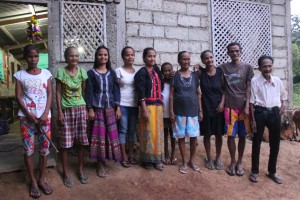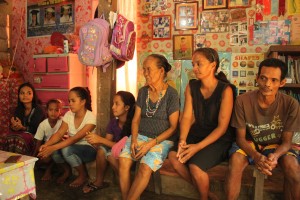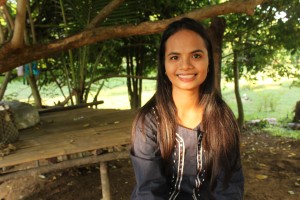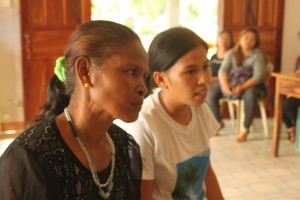Filipinos have a fun way of saying things and names. We are fond of repeated words, thus making it indeed, more fun in the Philippines. We have a fish named Lapu-Lapu, a flavor called bola-bola, a place called Balik-Balik, and a food labeled as pitchi-pitchi. Every day is termed araw-araw while every night is called gabi-gabi. And on the western part of the Philippines, in an island called Palawan, a surname from one of the indigenous tribe is called Nangnang, this year’s winner of the Search for Huwarang Pantawid Pamilya in region MiMaRoPa.
Guided by the eldest daughter, Jeheda, the visitors entered the humble abode of the Nangnangs. The cemented floor in the living room is well-kept with a rattan bench and small table at the center. Pictures of the family and recognition and awards of the children were displayed on the walls. The kitchen area although not yet cemented is also clean keeping their belongings organized, even the coconut ‘pawids’ that the family makes are stacked at one side.
As the whole family sits on the floor, wearing their shy smiles, they narrated their stories of struggles and hardships.
Working together

Tang and Lyn, as what Damedo and Jehelyn are often called, have promised themselves to do whatever they can to provide for their children. Being elementary graduates, the couple has dreamed of their children achieving more of what they have accomplished. They want their children to finish their education, to have a college degree.
“Kaya nga po kahit masama ang pakiramdam ko, umaakyat talaga ako ng bundok para puntahan ang taniman namin. Minsan, kahit masakit na talaga ang likod ko ay tuloy lang, mamamalayan ko nalang tumutulo ang luha ko,” said Tang.
The family plants crops in the mountain. It is a two-hour walk from their home. Usually, the family would go to the mountain on a Friday and stay there until Sunday to plant and harvest whatever crops there is.
Joela, second eldest, recalled, “Dati po tinawagan ko si Mama nung nasa boarding house ako, tapos may sakit siya nun pero umakyat parin siya ng bundok. Naawa po talaga ako kasi alam kong pagod pero tuloy parin sila sa pagtatrabaho.” The children are very grateful for their parents’ hard work to provide for the family. With the parents’ efforts, the children could not just stay still and let them do the work alone. In their own small way, the four daughters help in any way they can.
They have an estimated income of 5,000 to 7,000 monthly. The children help plant various crops and goes to tabuan or market day and sells them. Joela and Janet, third child, would sometimes prepare kakanin. Jeheda would also do some ironing while Jenny, the youngest would sometimes sell guava for an additional allowance. They also help make ‘banig’ or ‘pawid’.
Just like any compliant partner-beneficiaries, the Nangnang family uses their cash grants for the welfare of their children. They used their first cash grant intelligently to be able to sustain their family’s needs. When they first received their cash grant amounting to 2,800 pesos, the 1,500 were used to buy a pig. Until now, they are taking care of the same pig and were able to buy chickens and goats as well.
The family belongs to the set 4 grantees of Pantwid Pamilya. “Nagpapasalamat po ako sa programa at katuwang ko talaga sa gastusin sa pamilya. Para po akong may anak na lalaki dahil sa Pantawid,” said Tang. With proper budgeting, the family is able to provide their simple everyday needs and expenses.
But it is not everyday that they get simple expenses. There comes a time that one has to sacrifice and stop schooling to allow the others to continue.
Sacrificing for one another

Joela, 20 years old, is a first year college student just like Janet, 17, in Western Philippines University (WPU). Joela sacrificed and stopped for two years to give way for her older sister to graduate in college. She wanted to help with her sister’s expenses. Tang and Lyn did not agree first but because of Joela’s heart to help in the finances and with the family’s poor condition, the couple gave in.
Luckily, Joela found work within the home of a family friend, Mrs. Patricia Anunciado. She was an all around help in the house and sometimes works in another store.
“Masipag yang mga yan. Si Joela, maayos magtrabaho kaya kinuha narin namin. Alam ko kasing gustong tumulong sa mga kapatid niya at kailangan nila,” said Mrs. Anunciado. Mrs.Anunciadois a retired teacher in WPU. She used to stay in Nangnang’s house before since she teaches in an elementary school near their home. “Kaya naman maluwag ang loob kong tulungan sila kasi tinulungan rin nila ako noon,” said Mrs. Anunciado. She experienced the goodness of the family. Even with nothing to give, the Nangnangs did not think twice to help in any way they can.
Moreover, Ms. Sharon Rose Anunciado, daughter of Mrs. Anunciado also testified as to how good and hardworking the children are. She said that when Jeheda used to stay with them, she frequently uses their computer. She would research for her assignments and projects. As a sign of helping out, Ms. Anunciado would give the children a lieu way in paying for their dorm fee. She just allows the children to pay whenever they can. Currently, Joela and Janet are staying in their dormitory.
The Anunciados can be treated as the good karma of the Nangnangs. What the Nangnangs did is only offer their home to Mrs. Anunciado to be able to provide convenience for her while she teaches. The good deeds of the parents are now reaped by their daughters.
Achieving more
Since Jeheda already finished her studies and recently passed the Licensure Exam for Teachers (LET), it is now her turn to help her sisters. She promised to in a way slowly unburden their parents of the financial needs of her sisters’ education.
With renewed spirit to continue her studies, Joela is not ashamed even if she is of the same year in college with Janet. “Hindi ko kinakahiya na tumigil ako para matulungan ang kapatid kong makapagtapos,” said Joela. She is not only working to achieve her dreams but also of her parents’ for her to finish college. She is a first year student in WPU studying B.S. Social Work. Janet, on the other hand, is taking up an Education course like her Ate Jeheda.
The youngest, Jenny, is also a consistent honor student. When asked what she wants to be, she shyly answered, “Gusto ko pong maging nurse.” When asked why, “Para po magamot ko po sila Mama at Papa pag may sakit,” Jenny said.
At a young age, the love given by the parents is reciprocated by the children. The care for each other is evident through the stories that they narrate spontaneously, that even the people listening cannot help but shed a tear.
More of our own

The Nangnangs are 100 percent Tagbanuas. And they are very proud of it. The family could still play their traditional songs with a gong while the daughters dance. The three eldest daughters also lead in the festijos, a committee in-charge of the overall activities in a fiesta. Last year, they were the leaders of the fiesta for the municipality. They incorporated traditional songs and dances in the program. It is their way of reminding themselves and everyone who they are. Gladly, the audience liked it and applauded their performances. They are hoping that they will be invited again to head the event to showcase more talent of the Tagbanuas.
The children also know how to speak fluent Tagbanua. Lyn recalled, “Pag nasa bahay ay Tagbanua po talaga ang pinapasalita ko sa kanila pero pag nasa labas naman sila ay nagta-Tagalog. Pag hindi ka rin kasi marunong magsalita ng Tagalog ay mahuhuli ka lalo na sa mga klase.”
Because of their love of their own, Jeheda and Joela reached the island of Iloilo and Antique to meet other IP tribes as well. It was a seminar that they cannot forget. They learned that other tribes showcase their tradition freely and proudly. “Nung nagpunta nga po kami dun, andami po naming nalaman. At sinabi naming sa sarili namin, ‘kung kaya nila, kaya din natin’,” said Jeheda. They are inspired to promote to everyone who they are. “May mga nagsasabi po kasi sa amin na iba, “Ay! IP ka pero graduate ka?” na para bang pag IP ka, maliit ka lang. Hindi mo pwedeng abutin ang mga pangarap mo,” Jeheda added. She wants to prove to others that even though they are IP and poor, they can have a dream and reach them.
She wants to dispute the common knowledge that IPs mostly marry at a young age and illiterate. Jeheda has proven that your roots is not your weakness that should hinder you to achieve your dreams but a strength that one must embrace.
As a testament of the continuous heart of Jeheda to produce more of their own, she got a 100,000 peso-grant from the National Commission for Culture and the Arts (NCCA) for documenting the oral traditions of their family. The story started when an instructor from University of the Philippines Diliman learned that she is writing all of their oral traditions. The instructor then had an idea that Jeheda should create a proposal to the NCCA. Thinking that this will move their tribe forward, the latter, willingly agreed. Luckily, the Commission agreed and gave her a grant to be able to document and publish their traditions.
Influencing others

The family also participates actively in community activities. Analyn Pao, a barangay official, testified on the couple’s participation in the barangay. “Pag may mga gawain po dito ay aktibo naman po yan silang sumasama. Pag may selebrasyon, sasali po sila at tutugtog,” said Analyn. “Mababait at pala simba rin sila,” she added.
Lyn is also the leader of their sitio’s women’s group while Tang is sometimes called “Bossing” by others since he tells everyone of the barangay’s scheduled activities like the Family Development Sessions (FDS) of Pantawid Pamilya and KALAHI-CIDSS’s assemblies. Tang would come to the homes of other families and directs them to attend the activities. “Lahat ng mga yan ay para sa mabuti kaya dapat nating suportahan,” said Tang.
They are also active members of the church. Jeheda would also teach in the children’s ministry and tell them bible stories. Tang narrated, “Tinanggap ko po ang Diyos na aking tagapagligtas at gusto ko ay ganun din ang aking mga anak.” The daughters would also sometimes join the choir and conduct bible studies.
With how the couple raised their children, others look up to them. Lyn said, “Nagpapasalamat din ako kasi wala kaming matinding away na kinaharap na mag-asawa. Hindi ko naranasan na sinaktan ako ng asawa.”
The family lived in harmony that others see as well. With nothing much, Tang and Lyn has worked hard for their children to finish college. Still, they help others in any way they can. Their “Amay” or uncle said, “Dito talaga ako tumutuloy sa pamangkin ko pagkagaling ko ng Sagpangan kasi masaya sila dito at mababait ang mga apo ko.” They offer their homes to whomever visitor they have and let them stay in their room, and they will stay in the living area.
Life is never easy. Trials will always be there but as what Lyn believes, “Bawat araw naman talaga mahirap pero lahat naman yun pag napagdaanan na, basta maniwala lang tayo sa Panginoon, walang hindi kakayanin.”
And they can overcome anything as long as they are together. ###
![]()


